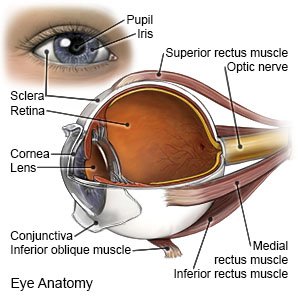Orbital Fracture in Children
Medically reviewed by Drugs.com. Last updated on Apr 6, 2025.
AMBULATORY CARE:
An orbital fracture
is a break in one or more of the bones around your child's eye. Orbital fractures are caused by a hard blow to the eye area. Car accidents and sports injuries are the most common causes.
 |
Common signs and symptoms:
Signs and symptoms depend on the type of fracture. Your child may have any of the following:
- Pain and bruising around the eye
- Swelling of the forehead, cheek, or area around the eye
- Pain or trouble when your child moves his or her eye
- Double, blurry, or decreased vision
- Numbness
- Blood in the white part of your child's eye
- An eye that bulges or sinks
Seek care immediately if:
- Your child's vision starts to blur.
- Your child says he or she starts to see double.
- Your child suddenly loses his or her vision.
- Your child has severe eye pain.
Call your child's doctor if:
- Your child has a fever.
- Your child's symptoms do not go away, or they get worse.
- You have questions or concerns about your child's condition or care.
Treatment for your child's orbital fracture:
Your child's provider may want to wait until the swelling decreases to decide if surgery is necessary. Minor fractures may not need surgery. Your child may need any of the following:
- Medicines:
- Decongestants can help decrease sinus pressure or congestion. This can help relieve pressure on your child's eye.
- Antibiotics may be prescribed to help prevent an infection.
- Steroids may be needed to decrease swelling.
- Acetaminophen decreases pain and fever. It is available without a doctor's order. Ask how much to give your child and how often to give it. Follow directions. Read the labels of all other medicines your child uses to see if they also contain acetaminophen, or ask your child's doctor or pharmacist. Acetaminophen can cause liver damage if not taken correctly.
- Do not give aspirin to children younger than 18 years. Your child could develop Reye syndrome if he or she has the flu or a fever and takes aspirin. Reye syndrome can cause life-threatening brain and liver damage. Check your child's medicine labels for aspirin or salicylates.
- NSAIDs , such as ibuprofen, help decrease swelling, pain, and fever. This medicine is available with or without a doctor's order. NSAIDs can cause stomach bleeding or kidney problems in certain people. If your child takes blood thinner medicine, always ask if NSAIDs are safe for him or her. Always read the medicine label and follow directions. Do not give these medicines to children younger than 6 months without direction from a healthcare provider.
- Give your child's medicine as directed. Contact your child's healthcare provider if you think the medicine is not working as expected. Tell the provider if your child is allergic to any medicine. Keep a current list of the medicines, vitamins, and herbs your child takes. Include the amounts, and when, how, and why they are taken. Bring the list or the medicines in their containers to follow-up visits. Carry your child's medicine list with you in case of an emergency.
- Surgery may be needed if your child has decreased movement and function of the eye. Surgery may also be needed if the eye needs to be repositioned in the socket.
Help your child's eye heal:
- Apply ice on your child's injured eye for 15 to 20 minutes every hour or as directed. Use an ice pack, or put crushed ice in a plastic bag. Cover it with a towel before you apply it to your child's eye. Ice helps prevent tissue damage and decreases swelling and pain.
- Remind your child to not blow his or her nose until the fracture has healed, or as directed. Blowing the nose can put pressure on your child's eye socket.
- Remind your child to try not to sneeze. Your child should sneeze with his or her mouth open if necessary. This will help decrease pressure on his or her eye.
- Do not let your child use a straw until his or her fracture has healed. Straws can increase the pressure in your child's face and eye socket.
Help prevent an orbital fracture:
Have your child wear protective eyewear during sports. This can prevent eye injury. Make sure the eyewear wraps around the sides of your child's face. Do not use regular eyeglasses for eye protection. They will not protect your child's eyes from injury.
Follow up with your child's doctor or ophthalmologist as directed:
Write down your questions so you remember to ask them during your visits.
© Copyright Merative 2025 Information is for End User's use only and may not be sold, redistributed or otherwise used for commercial purposes.
The above information is an educational aid only. It is not intended as medical advice for individual conditions or treatments. Talk to your doctor, nurse or pharmacist before following any medical regimen to see if it is safe and effective for you.
Further information
Always consult your healthcare provider to ensure the information displayed on this page applies to your personal circumstances.
